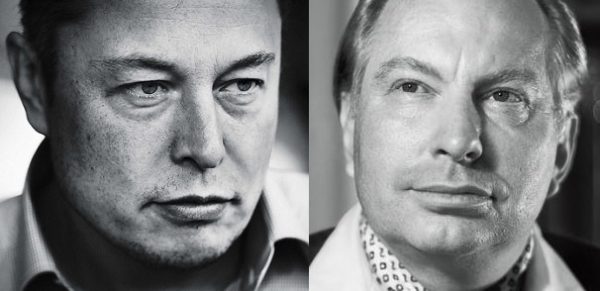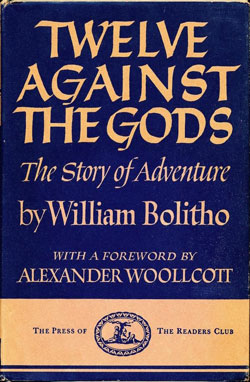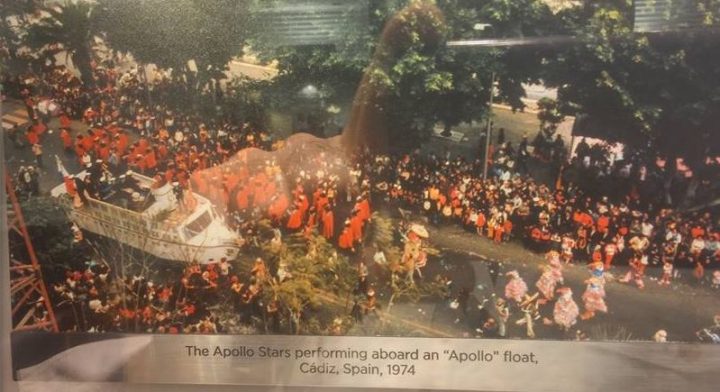We don’t keep a very watchful eye on Elon Musk and what he’s up to, so forgive us that we missed an interesting little news item about him last year which, once we were made aware of it, sort of knocked us for a loop.
Musk is the PayPal and Tesla Motors and SpaceX inventor, one of the richest people in the world, and he has legions of fans who follow his every move. So it was only natural that a Bloomberg reporter would take the opportunity at a press conference last summer to ask the avid reader what he was digging into recently. Musk gave an interesting answer, saying that he was enjoying an obscure 1929 book named Twelve Against the Gods.
The book was written by a South African journalist named William Bolitho (1891-1930), and it consists of twelve short biographies of people who had battled the gods to greatness, as it were. Long out of print, copies of the book could be found for about $6 at sites like eBay. But once Musk revealed that he was reading it, prices shot up and it quickly became hard to find a copy. Checking yesterday, we couldn’t find a copy at eBay for less than $250.
It made for a fun story that a number of different news organizations covered last summer, marveling that Musk had plucked from obscurity a book that almost no one had heard of.
No one, that is, except for Scientologists.
As soon as we saw the title, we remembered that Jon Atack has mentioned Twelve Against the Gods a couple of times here at the Underground Bunker. So we emailed Jon this week to ask him his thoughts on Elon Musk making a fad out of the book he told us was L. Ron Hubbard’s favorite.
Jon Atack: In February 1983, in written replies to Rocky Mountain News journalist Sue Lindsay, Hubbard said that his favorite non-fiction book was Twelve Against Gods by William Bolitho, adding, “the introduction is particularly good.”
The Bunker: February 1983? By that time Hubbard had been in total seclusion for three years, his whereabouts unknown even to nearly all Scientologists. How did he engage in a newspaper interview if he was in hiding?
Jon: He didn’t. For my book A Piece of Blue Sky I got to know Scientology’s former spokesman Robert Vaughn Young, who actually wrote Hubbard’s answers to the Rocky Mountain News (to prove that Hubbard was still alive). Vaughn told me he made up those answers by relying on a lecture that Hubbard had given on December 5, 1952 as part of the Philadelphia Doctorate Course.
The Bunker: Here’s what Hubbard said in that lecture:
Bolitho, good old Bolitho, with his Twelve Against the Gods. It’s a wonderful thing to read — gorgeous! And the introduction of Twelve Against the Gods is one of the best pieces of work I know of, even related to a lot of things, and particularly to this subject.
Jon: Bolitho’s book was published in 1929, and consists of 12 short biographies. Its central point is that “adventure is the vitaminizing element in histories both individual and social.” Bolitho lauded the adventurer above all others. His twelve chosen adventurers were Alexander, Casanova, Columbus, Mahomet (the Prophet Muhammad), Lola Montez, Cagliostro (and Seraphina), Charles XII of Sweden, Napoleon, Catiline, Napoleon III, Isadora Duncan and, for topical reasons, Woodrow Wilson. Judging by the tone of the book, had Bolitho written a new edition in the 1940s, Hitler would very probably have replaced Wilson. The following quotations are all taken from the “particularly good” introduction, and clearly state Bolitho’s basic thesis…
The adventurer is within us, and he contests for our favor with the social man we are obliged to be … we are obliged, in order to live at all, to make a cage of laws for ourselves and to stand on the perch. We are born as wasteful and unremorseful as tigers; we are obliged to be thrifty, or starve or freeze. We are born to wander, and cursed to stay and dig … all the poets are on one side and all the laws on the other; for laws are made by, and usually for, old men…
The moment one of these truants breaks loose, he has to fight the whole weight of things as they are; the laws and that indefinite smothering aura that surrounds the laws that we call morals; the family, that is the microcosm and whip-lash of society; and the dead weight of all the possessors, across whose interwoven rights the road to freedom lies. If he fails he is a mere criminal…
… the adventurer is an individualist and an egotist, a truant from obligations. His road is solitary; there is no room for company on it.
What he does, he does for himself. His motive may be simple greed.
The Bunker: That does sound like something Hubbard would find inspirational. Valuing the man who has lived as much as a dozen other men, etc.
Jon: However, as Bolitho said, “these are men betrayed by contradiction inside themselves.” With his casual reference to Twelve Against the Gods, Hubbard gave his own betraying contradiction: It is a glaring admission of his deep-seated aspirations. The quoted passages give concise expression to the underlying pattern of Hubbard’s whole life, and to his self-image. Hubbard considered himself an adventurer, a man above morality, who steadfastly followed his goal. It is possible that Hubbard read Bolitho’s book when it was published (he was 18 at the time), and took it as his model. There is powerful evidence to support this thesis. In 1939, at the age of 27, just after his failure to find a publisher for Excalibur, Hubbard wrote to his first wife…
Living is a pretty grim joke, but a joke just the same. The entire function of man is to survive. Not “for what” but just to survive. The outermost limit of endeavor is creative work. Anything less is too close to simple survival until death happens along. So I am engaged in striving to maintain equilibrium sufficient to at last realize survival in a way to astound the gods. Personal immortality is only to be gained through the printed word, barred note or painted canvas or hard grabite [sic]. Foolishly perhaps, but determined none the less, I have high hopes of smashing my name into history so violently that it will take a legendary form even if all the books are destroyed. That goal is the real goal as far as I am concerned. Things which stand too consistently in its way make me nervous. It’s a pretty big job. In a hundred years Roosevelt will have been forgotten – which gives some idea of the magnitude of my attempt. And all this boils and froths inside my head and I’m miserable when I am blocked. Let the next man concentrate upon “peace” and “contentment.” When life was struck into me something else accompanied it. And when I leave things in the lap of the gods who seem to be interested in my destiny, boy, things happen!
My fight right now is to get into a spot where I can tide across the gap until the next blaze. Excalibur [“The Book”] may be fought, accepted or forgotten. I don’t care. I seem to be the only one that has attained actual personal contact with it. Others take it mentally and seem to be at a loss to apply it. When I wrote it I gave myself an education which outranks that of anyone else. I don’t know but it might seem that it takes terrific brain work to get the thing assembled and useable in the head. I do know that I could formulate a political platform, for instance, which would encompass the support of the unemployed, the industrialist and the clerk and day laborer all at one and the same time. And enthusiastic support it would be. Things are due for a bust in the next half dozen years. Wait and see…
I seem to have a sort of personal awareness which only begins to come alive when I begin to believe in a destiny. And then a strange force stirs in me and I seem to be completely aloof and wholly invincible. It is the problem of “Who am I?”
Psychiatrists, reaching the high of a dusty desk, tell us that Alexander and Genghis Khan and Napoleon were madmen. I know they were maligning some very intelligent gentlemen. So anybody who dares say that maybe he’s going to cut things up considerably is immediately branded as a [sic] egomaniac or something equally ridiculous so that little men can still save their hides in the face of possible fury. It’s one thing to go nutty and state, “I’m Napoleon, nobody dares touch me,” and quite another to say, “If I watch my step and don’t let anything stop me, I can make Napoleon look like a punk.” That’s the difference … It’s a big joke, this living. God was feeling sardonic the day He created the Universe. So its [sic] rather up to at least one man every few centuries to pop up and come just as close to making Him swallow his laughter as possible.
Anyway, these are the things about which I revolve. I can’t blame it on environment or experience, strangely enough. When I was eight I remember figuring out how long it would take me to achieve these ends, still saying to myself, “Who am I?” And I said it at sixteen and I’m saying it at twenty-six even though the old cards persist in getting stacked against me and people are often like tugs trying to shunt me into a dismally peaceful berth. A few months of cold logic on the subject I struck upon in February have shown me that I didn’t have it all under control. Hence I must needs slow down on my concept, though it broadened in another way which compensates and it has some popularity angles now which it lacked before. I guess I’m thirty percent showman after all because I instinctively dive towards popular huzzahs. And so, quite magnanimously for me, I gave man back his human soul and created a new explanation for creative urge [sic] which the lads will love. Nonetheless, the things are as true as can be.
The Bunker: Hubbard was pretty desperate to live a life that rivaled Bolitho’s dozen.
Jon: Hubbard lusted after fame, wealth and power, and was clearly willing to abandon moral restrictions to accomplish his ends. By his own admission, Hubbard was a showman. He was a natural entertainer, able to captivate some people with his charm. It often took prolonged, close contact for those so charmed to see that he was arrogant, extravagant, eccentric and a liar on a grand scale. Even then many continued to believe in his genius.
Hubbard could be dismissed as a fabulist, a compulsive storyteller, whose exaggerations were harmless. But he was far worse than this. His avarice, coupled with deliberate deceit, became outright fraud. Hubbard plainly made fraudulent claims about himself and his supposed research. He also made fraudulent claims about the money gathered ostensibly to further the publicized aims of Scientology. This was not harmless puffery: It was conscious deceit designed to make him ever more famous, influential and wealthy. The poverty and suffering of those believers who sustained his opulent life-style must also be taken into account.
Although Hubbard single-mindedly pursued his ambition, he may well have believed throughout that he was doing good. Nonetheless, he laid his “road to truth” on a foundation of lies. Hubbard’s long hours and obvious absorption in his work support the view that he believed in the efficacy of his “Technology.” Bolitho’s idea that “the magician must believe in himself, if it is only as long as he is spouting,” falls short of the mark. Martin Gardner, well-known adversary of parapsychology in general and Ron Hubbard in particular, made a germane observation: “Cranks by definition believe their theories, and charlatans do not, but this does not prevent a person from being both crank and charlatan.” Hubbard’s fraudulent claims make a charlatan of him.
The Bunker: Well, OK, Jon. Thanks for that pretty grim explanation of why L. Ron Hubbard found common cause with Bill Bolitho. But what does it say about Musk?
We couldn’t find a story that explained how Musk had stumbled across Twelve Against the Gods. And as far as we know, the South African-born inventor isn’t mixed up with Scientology. Maybe the common country of origin was enough to bring Bolitho to his attention.
As for what Musk sees in the book, we’ll point out that Elon Musk is an adventurer in a way that Hubbard only pretended to be. Hubbard talked a big game — he was a world-class tall-tale teller, there is no doubt — but he was mostly all talk and many of his claims about his adventures turned out to be exaggerations. Musk, on the other hand, really is disrupting the automobile and space industries and heck, we want some of those solar power shingles he was showing off the other day.
If Musk sees himself in the company of Alexander and Napoleon, well, he may actually have a point. He wants to start cities on Mars, and if that’s not battling against the gods, we don’t know what is. But Hubbard in the same list of names? Pshaw! As if.
——————–
Bonus items from our tipsters
Yesterday, we were discussing Scientology’s museum to L. Ron Hubbard and the Sea Org that is part of its Super Power Building in Clearwater, Florida. One of our tipsters found that a Scientologist from Spain recently toured that museum and put up a few photos that help illustrate what we were reading about yesterday.
——————–
HowdyCon 2017: Denver, June 23-25. Go here to start making your plans.
——————–
 Posted by Tony Ortega on February 1, 2017 at 07:00
Posted by Tony Ortega on February 1, 2017 at 07:00
E-mail tips and story ideas to tonyo94 AT gmail DOT com or follow us on Twitter. We post behind-the-scenes updates at our Facebook author page. After every new story we send out an alert to our e-mail list and our FB page.
Our book, The Unbreakable Miss Lovely: How the Church of Scientology tried to destroy Paulette Cooper, is on sale at Amazon in paperback, Kindle, and audiobook versions. We’ve posted photographs of Paulette and scenes from her life at a separate location. Reader Sookie put together a complete index. More information about the book, and our 2015 book tour, can also be found at the book’s dedicated page.
The Best of the Underground Bunker, 1995-2016 Just starting out here? We’ve picked out the most important stories we’ve covered here at the Undergound Bunker (2012-2016), The Village Voice (2008-2012), New Times Los Angeles (1999-2002) and the Phoenix New Times (1995-1999)
Learn about Scientology with our numerous series with experts…
BLOGGING DIANETICS: We read Scientology’s founding text cover to cover with the help of L.A. attorney and former church member Vance Woodward
UP THE BRIDGE: Claire Headley and Bruce Hines train us as Scientologists
GETTING OUR ETHICS IN: Jefferson Hawkins explains Scientology’s system of justice
SCIENTOLOGY MYTHBUSTING: Historian Jon Atack discusses key Scientology concepts
Other links: Shelly Miscavige, ten years gone | The Lisa McPherson story told in real time | The Cathriona White stories | The Leah Remini ‘Knowledge Reports’ | Hear audio of a Scientology excommunication | Scientology’s little day care of horrors | Whatever happened to Steve Fishman? | Felony charges for Scientology’s drug rehab scam | Why Scientology digs bomb-proof vaults in the desert | PZ Myers reads L. Ron Hubbard’s “A History of Man” | Scientology’s Master Spies | Scientology’s Private Dancer | The mystery of the richest Scientologist and his wayward sons | Scientology’s shocking mistreatment of the mentally ill | Scientology boasts about assistance from Google | The Underground Bunker’s Official Theme Song | The Underground Bunker FAQ
Our Guide to Alex Gibney’s film ‘Going Clear,’ and our pages about its principal figures…
Jason Beghe | Tom DeVocht | Sara Goldberg | Paul Haggis | Mark “Marty” Rathbun | Mike Rinder | Spanky Taylor | Hana Whitfield













